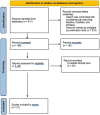Patient Experiences with Clostridioides difficile Infection and Its Treatment: A Systematic Literature Review
- PMID: 37395984
- PMCID: PMC10390453
- DOI: 10.1007/s40121-023-00833-x
Patient Experiences with Clostridioides difficile Infection and Its Treatment: A Systematic Literature Review
Abstract
Introduction: Clostridioides difficile infection (CDI) is a globally recognized cause of morbidity and mortality with devastating effects on health-related quality of life (HRQoL). The objective of this study was to conduct the first systematic literature review (SLR) to assess the humanistic burden of CDI on patient experiences, including HRQoL and related constructs, and attitudes towards treatment alternatives.
Methods: An SLR was conducted to identify peer-reviewed articles that assessed CDI, including recurrent CDI (rCDI), and patient-reported outcomes or HRQoL. PubMed, Embase, and the Cochrane Collaboration abstracting services were used to conduct literature searches from 2010 to 2021 in the English language. This SLR was conducted in accordance with Preferred Reporting Items for Systematic Reviews and Meta-analyses (PRISMA) criteria.
Results: Of 511 identified articles, 21 met study inclusion criteria. The SLR showed CDI has a devastating impact on patients' overall HRQoL that continues well beyond infection clearance. The impact of CDI on physical, emotional, social, and professional well-being rivaled abdominal symptoms of uncontrollable diarrhea, being worse for patients with rCDI. Patients with CDI feel isolated, depressed, lonely, and continue to be frightened of recurrences as well as being contagious to others. Most believe that they will never be free of CDI.
Conclusion: CDI and rCDI are debilitating conditions affecting physical, psychological, social, and professional functioning of patients' HRQoL, even long after the event has occurred. The results of this SLR suggest that CDI is a devastating condition in need of better prevention strategies, improved psychological support, and treatments that address the microbiome disruption to break the cycle of recurrence. Additional safe and effective therapies are needed to address this unmet medical need.
Keywords: Clostridioides difficile; Infectious diarrhea; Microbiome; Patient engagement; Patient experience; Patient-reported outcomes; Quality of life; Survey.
Plain language summary
Clostridioides difficile infection is a gut bacterial infection that can happen after a person has taken antibiotics to treat another infection. C. difficile infection can lead to other medical problems and death. This review of the literature aimed to understand how C. difficile infection (first, previous, and repeat occurrences), the severe diarrhea it causes, and available treatments (both old and new) for C. difficile infection can impact a person’s quality of life, daily self-care activities, and attitudes toward treatment. Results from this review of 21 studies showed that C. difficile infection has a negative impact on the quality of life of patients, affecting their physical, mental, and social health. C. difficile infection also disrupted the professional lives of patients and their ability to perform work activities. This negative effect continued over time, long after the infection had cleared because patients feared it would come back again. Treating C. difficile infection improved quality of life. Findings suggest that C. difficile infection is a devastating condition that needs better prevention strategies, improved psychological support, and treatments that stop the cycle of repeated gut infections by restoring good gut flora.
© 2023. The Author(s).
Conflict of interest statement
Sissi V. Pham, Dan Gratie, Duska M. Franic, and Alpesh Amin are consultants to Seres Therapeutics. In addition, Alpesh Amin has been PI or Co-I of clinical trials sponsored by NIH/NIAID, NeuroRx Pharma, Pulmotect, Blade Therapeutics, Novartis, Takeda, Humanigen, Eli Lilly, PTC Therapeutics, OctaPharma, Fulcrum Therapeutics, and Alexion. Alpesh Amin has served as speaker and/or consultant for BMS, Pfizer, BI, Portola, Sunovion, Mylan, Salix, Alexion, AstraZeneca, Novartis, Nabriva, Paratek, Bayer, Tetraphase, Achogen LaJolla, Ferring, Seres, Spero, Eli Lilly, Millennium, HeartRite, Aseptiscope, and Sprightly. Daniel C. Malone and Edward P. Armstrong are consultants to Seres Therapeutics through Strategic Therapeutics, LLC. Seres Therapeutics has an investigational product being studied in the treatment of
Figures
References
-
- Centers for Disease Control and Prevention. 2019 AR Threats Report. https://www.cdc.gov/drugresistance/biggest-threats.html#cdiff. Accessed 15 June 2023.
Publication types
LinkOut - more resources
Full Text Sources
Miscellaneous


